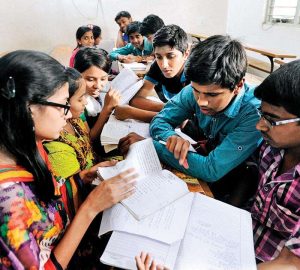Technology and artificial intelligence have brought about a significant transformation in schools and colleges, revolutionizing the way education is delivered and experienced. From the classroom to administrative tasks, technology and AI enhance teaching methods and learning outcomes and stream the educational process. Let’s delve into how these advancements reshape education in schools and colleges.
AI-powered adaptive learning systems are gaining popularity in schools and colleges. These systems analyze students’ performance, track their progress, and provide personalized learning experiences. By assessing individual strengths and weaknesses, the adaptive learning app offers tailored content and targeted interventions to address students’ needs. This individualized approach promotes mastery of concepts, boosts engagement, and improves overall academic performance.
Technology and AI also enable remote and blended learning models. In crises like the COVID-19 pandemic, online platforms and video conferencing tools have become essential for distance education. Schools and colleges can deliver live or pre-recorded lectures, facilitate discussions, and provide assignments through virtual platforms and online attendance for students. This flexibility in learning modalities allows students to access education from anywhere, accommodating different schedules and circumstances.
In addition, administrative tasks in schools and colleges are being streamlined and automated through technology and AI. Online portals and student information systems efficiently handle enrollment, course registration, and grading processes. Automated systems can generate reports, track attendance, and manage academic records seamlessly.
One primary way technology and AI transform education is by integrating digital tools and resources in classrooms and school management system.
Furthermore, technology and AI play a crucial role in assessment and feedback. Computer-based testing platforms provide objective and standardized assessments, reducing human bias. AI algorithms can analyze students’ responses, evaluate their performance, and generate instant feedback. This immediate feedback helps students identify areas of improvement and make necessary adjustments in their learning strategies. Educators can also access data-driven insights to assess class performance, identify trends, and adapt teaching methods.
Technology and AI facilitate collaborative learning experiences. Online platforms and tools enable students to collaborate on projects, share resources, and engage in virtual discussions. Virtual classrooms and discussion boards foster student communication and interaction, enhancing critical thinking and teamwork skills. Students can also engage in global connections and cultural exchanges, broadening their perspectives and promoting cultural understanding.
However, challenges such as the digital divide and technology literacy must be addressed to ensure equitable access to educational opportunities. Efforts must be made to bridge the gap in access to technology and reliable internet connectivity, particularly in underserved communities. Schools and colleges must also focus on technology training and professional development for educators, enabling them to leverage technology and AI tools in their teaching practices effectively.
In conclusion, technology and AI are reshaping education in schools and colleges by enhancing teaching methodologies, personalizing learning experiences, and improving administrative processes. From interactive classrooms to adaptive learning systems, these advancements empower students, promote collaboration, and provide educators with valuable insights. By addressing challenges and embracing these innovations responsibly, schools and colleges can create a future-ready educational environment that prepares students for the challenges and opportunities of the modern world.




